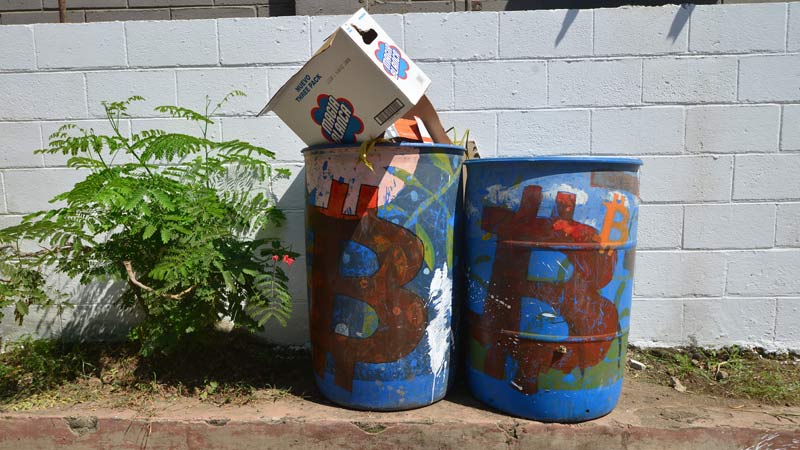Just one day after signing an agreement with the International Monetary Fund (IMF) establishing that the government must restrict its Bitcoin purchases, the Oficina Nacional de Bitcoin (ONB) (National Bitcoin Office) announced on Thursday yet another acquisition of this crypto asset.
“In the future, commitments within the program will limit the government’s participation in Bitcoin-related economic activities, as well as in Bitcoin transactions and purchases made by the government,” read the strong reaffirmation of the IMF to Nayib Bukele’s administration, issued through the organization’s Executive Board.
In a statement released Wednesday following the review of the agreement reached in December, the multilateral organization reiterated that the government must cease acquiring Bitcoin.
However, the governmental agency led by Stacy Herbert, who was appointed by Bukele as director of the ONB, has disregarded what was established in the agreement.
“El Salvador just added another bitcoin to our strategic reserve. That makes 10 BTC in the last 7 days. This is how we keep winning!… Can’t stop, won’t stop!” the entity posted on its account on X Thursday afternoon, alongside an image showing the transaction made at 2:05 p.m.
Following the agreement announced at the end of 2024, the government continued to purchase cryptocurrency assets. In fact, on February 25, one day before the IMF met to review the agreement, the National Bitcoin Office recorded that they had acquired 42 units in the last 30 days, totaling over $3.6 million. President Bukele himself has stated that the government’s Bitcoin reserve exceeds 6,000 crypto assets.
Regarding the amendments to the Bitcoin Law approved in January to address the IMF’s requests, the organization stated in its press release that “the potential risks of the Bitcoin project are being addressed in accordance with Fund policies and according to the Fund’s advice to the authorities.”
It mentioned that the legal reforms have made the acceptance of Bitcoin voluntary in the private sector and ensured that taxes will be payable exclusively in US dollars.
According to the IMF, the government “has increased transparency around the public cryptocurrency electronic wallet.” However, expenditures or financial statements related to the Chivo Wallet, for example, have not been publicly disclosed.
Under the agreement with the IMF, “the government plans to gradually reduce its involvement in the electronic wallet.” So far, the only information released is that the state wallet will either be “sold or discontinued,” as communicated in December by the director of the National Bitcoin Office.
The Fund also noted that “the regulation and supervision of digital assets will be strengthened in line with evolving international best practices.”
Gobierno vuelve a comprar Bitcoin, pese a firmar acuerdo con FMI
Un día después de firmar un acuerdo con el Fondo Monetario Internacional (FMI), que establece que el gobierno debe limitar las compras de Bitcoin, la Oficina Nacional de Bitcoin (ONB) volvió a anunciar este jueves que adquirió otro criptoactivo más.
“En el futuro, los compromisos del programa limitarán la participación del gobierno en actividades económicas relacionadas con Bitcoin, así como las transacciones y compras de Bitcoin por parte del gobierno”. Esa fue la contundente reafirmación del Fondo Monetario al gobierno de Nayib Bukele, mediante el Directorio Ejecutivo de la entidad.
En el comunicado emitido el miércoles, tras la revisión del acuerdo alcanzado en diciembre, el organismo multilateral volvió a enfatizar que el gobierno debe dejar de hacer compras de Bitcoin.
Sin embargo, la entidad gubernamental dirigida por Stacy Herbert, nombrada por Bukele en el cargo de directora de la ONB, ha ignorado lo establecido en el acuerdo.
“El Salvador acaba de añadir otro bitcoin a nuestra reserva estratégica. Eso hace 10 BTC en los últimos 7 días. ¡Así es como seguimos ganando!… ¡No puedo parar, no quiero parar!”, publicó la entidad en su cuenta de X, el jueves por la tarde, junto a la imagen de la transacción hecha a las 2:05 p.m.
Después del acuerdo anunciado a finales de 2024, el gobierno siguió haciendo compras de criptoactivos. De hecho, el 25 de febrero, un día previo a que el FMI se reuniera para revisar el acuerdo, la Oficina Nacional de Bitcoin registraba que en los últimos 30 días habían adquirido 42 unidades por un valor de más de $3.6 millones. El mismo presidente Bukele ha dicho que la reserva de bitcoins del gobierno asciende a más de 6,000 criptoactivos.
Y ante las reformas a la Ley Bitcoin que fueron aprobadas en enero, para cumplir con la petición del FMI, el organismo planteó en su comunicado que “los riesgos potenciales del proyecto Bitcoin se están abordando de acuerdo con las políticas del Fondo y con el asesoramiento del Fondo a las autoridades”.
Mencionó que las reformas legales establecieron que será voluntaria la aceptación de Bitcoin en el sector privado y que se garantizó que el pago de impuestos se realizará únicamente en dólares estadounidenses.
Según el Fondo, el gobierno “ha reforzado la transparencia de la billetera electrónica pública de criptomonedas”. Sin embargo, no se conocen públicamente los gastos o estados financieros de la Chivo Wallet, por ejemplo.
De acuerdo a lo pactado con el FMI, “el Gobierno planea reducir gradualmente su participación en la billetera electrónica”. Lo único que se ha conocido hasta la fecha es que la billetera estatal sería “vendida o descontinuada”, según comunicó en diciembre la directora de la Oficina Nacional de Bitcoin.
El Fondo también indicó que “se mejorará la regulación y supervisión de los activos digitales en línea con las mejores prácticas internacionales en evolución”.

